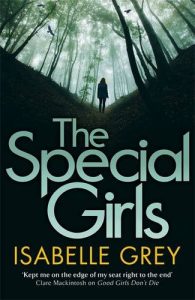 The Special Girls by Isabelle Grey
The Special Girls by Isabelle Grey
Published by Quercus
Want You Gone by Chris Brookmyre
Published by Little, Brown
You Can Run by Steve Mosby
Published by Orion UK, Pegasus US
Fallout by Sara Paretsky
Published by Hodder & StoughtonUK, William Morrow US
He Said/She Said by Erin Kelly
Published by Hodder & Stoughton UK, Minotaur US
This month provides plenty of refreshment for those who want more than the currently fashionable domestic noir. Isabelle Grey gives her quiet, intelligent, beleaguered DI Grace Fisher a cold-case enquiry into decades-old allegations of sexual abuse against Professor Ned Chesham. He’s an expert in eating disorders, 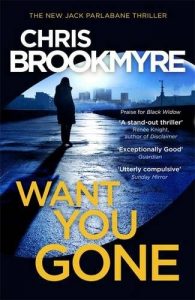 who takes groups of patients camping on the estate of old friends in East Anglia. When a young doctor working with him is murdered on the estate, the authorities are scared the old allegations will resurface and cause all kinds of political trouble for the heroic Chesham and themselves.
who takes groups of patients camping on the estate of old friends in East Anglia. When a young doctor working with him is murdered on the estate, the authorities are scared the old allegations will resurface and cause all kinds of political trouble for the heroic Chesham and themselves.
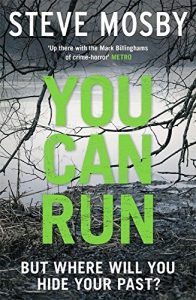 Grey’s methods are as intelligent and unhysterical as those of her heroine when she lays bare the agonies of families dealing with anorexic children, as well as the absolute destruction caused by sexual abusers, destruction not only of their immediate victims but of all those who didn’t listen to them or who listened and yet couldn’t help. This is an absorbing and impressive novel.
Grey’s methods are as intelligent and unhysterical as those of her heroine when she lays bare the agonies of families dealing with anorexic children, as well as the absolute destruction caused by sexual abusers, destruction not only of their immediate victims but of all those who didn’t listen to them or who listened and yet couldn’t help. This is an absorbing and impressive novel.
Chris Brookmyre builds Want You Gone around another crime that has been much in the news recently. Journalist Jack 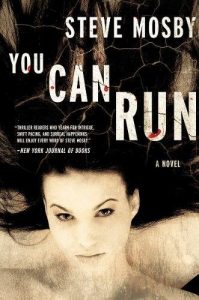 Parlabane has been sucked into a computer-hacker’s web, having asked favours and now being required to offer favours in return. Buzzkill, the hacker, has become something of a nemesis and on this occasion Parlabane finds himself in serious physical danger as well as chased by the forces of law and order as he tries to pay his debts. This is an exciting, clever and ultimately moving exploration of responsibility and freedom.
Parlabane has been sucked into a computer-hacker’s web, having asked favours and now being required to offer favours in return. Buzzkill, the hacker, has become something of a nemesis and on this occasion Parlabane finds himself in serious physical danger as well as chased by the forces of law and order as he tries to pay his debts. This is an exciting, clever and ultimately moving exploration of responsibility and freedom.
The first chapter of Steve Mosby’s You Can Run opens with a heart-sinking scene of a kidnapped woman in pain and terror, but this is no tick-box serial-killer thriller. Several women have 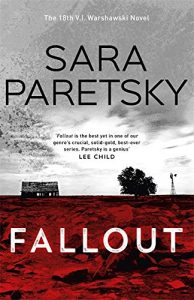 indeed gone missing over the years and a dysfunctional psychopath has been taking them for his own revolting pleasure, before apparently crank letters arrive at the relevant police stations all starting: ‘I want to tell you a story about a girl named…’ The killer is found by accident and it is then that Mosby winds up the tension as Will Turner and Emma Beck investigate the letters, the killer, the victims’ families and their own motives and terrors. The ultimate revelations are as much about the nature of love, friendship and hate as about police procedure and serial killing.
indeed gone missing over the years and a dysfunctional psychopath has been taking them for his own revolting pleasure, before apparently crank letters arrive at the relevant police stations all starting: ‘I want to tell you a story about a girl named…’ The killer is found by accident and it is then that Mosby winds up the tension as Will Turner and Emma Beck investigate the letters, the killer, the victims’ families and their own motives and terrors. The ultimate revelations are as much about the nature of love, friendship and hate as about police procedure and serial killing.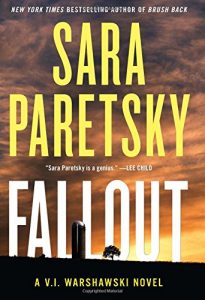
Sara Paretsky’s V. I .Warshawski moves out of Chicago in Fallout and into the world in which Paretsky herself grew up, rural Kansas. She has been asked by her irrepressible goddaughter Bernie to find a young film maker, who has disappeared with an elderly black actress, whose life story he is trying to record. The chase takes Warshawski into familiar professional and emotional territory as she battles corrupt commercial interests and their official protectors, sexists, and destructive relatives. Her close friend and neighbour Mr Contreras is now over ninety and she herself can no longer fight and escape malefactors entirely on her own, but her grit is unsoftened and her rage is still inspiring. As she gets to know the background to a helpless drug-addicted street-sleeper involved in the case, she reflects on her own childhood, understanding that its material poverty and the untimely death of her parents cannot take away her great good fortune in being the child of parents linked by devotion 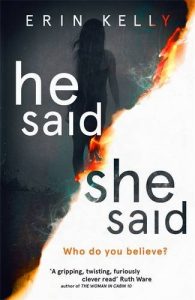 and honesty. The two sides of family life are laid bare here to great effect.
and honesty. The two sides of family life are laid bare here to great effect.
For any reader who needs a domestic noir fix, Erin Kelly provides plenty in He Said/She Said. Laura and Kit met when they were very young and have stayed together ever since, in spite of a disaster that has meant they must live beneath the radar, with no on-line presence that could lead their enemies to their latest address. He has been a passionate follower of solar eclipses since boyhood, travelling the world to catch each one, now on his way to Scandinavia. She is anxious, pregnant with twins, and full of heavily repressed anger as she waits at home. Moving between the present and their early years together, Kelly describes how, soon after the first meeting, they went together to watch an eclipse at a festival in Cornwall and turned their golden life into something much darker.
In the aftermath of the main event, Laura sees a young woman being raped and intervenes. Kit chases the man as he runs off and Laura tries to comfort the victim, later testifying to what she saw in court. Her first affection for the victim is tested in the years that follow, and the stresses caused by their relationship and Laura’s growing doubts affect her relationship with Kit. This is a skilful examination of a serious problem: how can anyone except the parties immediately involved know whether what looks or sounds like forced sex could in fact be consensual? But Kelly then strays well into domestic noir territory, leaving the reader with its fundamental message (which has nothing to do with rape) that if you are unhappy someone else is to blame and you have no responsibility for working out how to heal yourself, but, if you are lucky, you will discover what exactly they have been doing to you and so be able to get your revenge.
